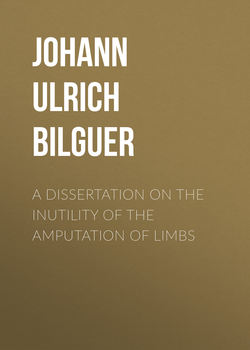Читать книгу A dissertation on the inutility of the amputation of limbs - Johann Ulrich Bilguer - Страница 18
SECT. XV
ОглавлениеThe bark may be given by itself, in powder, or made into an electuary with rob of elder, or with the syrup of quinces, cinnamon, orange-peel, or any other cordial syrup; if it purges when taken in substance, it must be administered in the infusion or extract. If the fever be strong, the heat considerable, and the patient thirsty, the bark will be of no service12; but recourse must be had to medicines which may abate the fever and allay the heat, such as are commonly called temperants.
If the bark be judged necessary, it may be given in doses of half a dram or two scruples, at first every hour, afterwards every two hours, and at length, once every three or four hours: To each dose may be added a few drops of spirit of sea salt, or of dulcified spirit of vitriol, or a few grains of alum or catechu. If the patient be very weak, a small glass of some acid wine may be ordered with the medicine, such as Rhenish, Neckar or Moselle wine, &c. When it is thought proper to promote perspiration, an infusion of chamomile may be drank, as is recommended by Dr. Pringle. Let the strength be supported by the plain regimen, directed by that physician in the same treatise.
Let the drink be water and vinegar, weak veal and chicken broth, gruels of barley or oatmeal, acidulated with vinegar or juice of lemons, &c. I have not room, in this place, to enter into a more particular discussion.
12
Mr. Bilguer might have even said hurtful; the only true temperants are, repeated bleedings and the acids, which are preferable to nitre, which is not very proper wherever there is reason to apprehend a mortification. Absorbents, which in some parts of the country where Mr. Bilguer writes, are still ranked in the class of temperants, are very hurtful in the present case, and never afford any relief to wounded patients.
